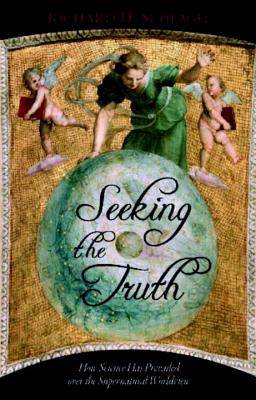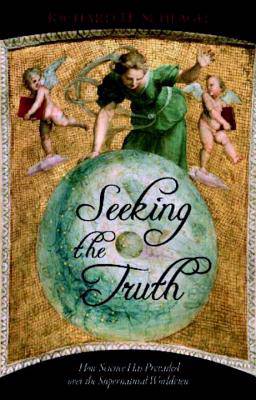
- Afhalen na 1 uur in een winkel met voorraad
- Gratis thuislevering in België vanaf € 30
- Ruim aanbod met 7 miljoen producten
- Afhalen na 1 uur in een winkel met voorraad
- Gratis thuislevering in België vanaf € 30
- Ruim aanbod met 7 miljoen producten
Zoeken
Seeking the Truth
How Science Has Prevailed Over the Supernatural Worldview
Richard H Schlagel
Paperback | Engels
€ 80,95
+ 161 punten
Omschrijving
In this sweeping intellectual history, philosopher Richard H. Schlagel compares the conceptual worldviews of science and religion, their distinct historical origins, their radically different experiential foundations, and their contrasting methods of justification. With great clarity and an impressive command of the historical facts, he depicts Western civilization as a composite of two diverse traditions--the empirical-rationalistic perspective of the ancient Greek philosophers and the mystical-revelatory approach of Judeo-Christian religion. Today, science, the inheritor of the Greek empirical-rationalistic approach, is clearly in the ascendancy. Schlagel shows how and why science has achieved its remarkable success, while religion, still burdened by archaic, static concepts anchored in a vanished past, has experienced more and more cognitive and emotional difficulties accommodating scientific discoveries. Looking to the future, Schlagel argues that scientific inquiry is clearly superior to faith in ancient religious doctrines to cope with the challenges of climate change, energy sources, environmental protection, population increases, and the global economy. He concludes that the health of democratic societies will depend, in large part, on an educated citizenry that appreciates the importance of science and recognizes the retrograde tendencies of the fundamentalist mindset both in the United States and abroad.
Specificaties
Betrokkenen
- Auteur(s):
- Uitgeverij:
Inhoud
- Aantal bladzijden:
- 518
- Taal:
- Engels
Eigenschappen
- Productcode (EAN):
- 9781591027744
- Verschijningsdatum:
- 30/04/2010
- Uitvoering:
- Paperback
- Formaat:
- Trade paperback (VS)
- Afmetingen:
- 140 mm x 213 mm
- Gewicht:
- 580 g

Alleen bij Standaard Boekhandel
+ 161 punten op je klantenkaart van Standaard Boekhandel
Beoordelingen
We publiceren alleen reviews die voldoen aan de voorwaarden voor reviews. Bekijk onze voorwaarden voor reviews.











